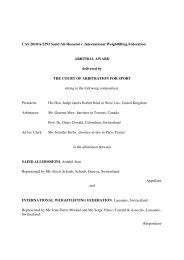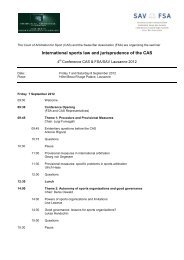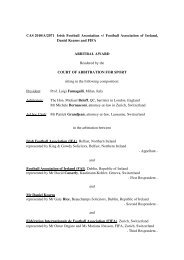(CAS) Bulletin - Tribunal Arbitral du Sport / TAS
(CAS) Bulletin - Tribunal Arbitral du Sport / TAS
(CAS) Bulletin - Tribunal Arbitral du Sport / TAS
You also want an ePaper? Increase the reach of your titles
YUMPU automatically turns print PDFs into web optimized ePapers that Google loves.
2. Considering the plenary power of monolithic<br />
Olympic and international sports governing<br />
bodies, which require athletes to submit to fi nal<br />
and binding <strong>CAS</strong> arbitration as a condition of<br />
participation 35 , what should be the appropriate<br />
role of the <strong>CAS</strong>? Should <strong>CAS</strong> arbitrators have a<br />
broad scope of equitable power and function more<br />
like a court by acting as an external regulatory<br />
constraint and ensuring that the legal rights of<br />
particular parties (e.g., Olympic and international<br />
sport athletes) are protected adequately 36 ?<br />
3. Is <strong>CAS</strong> jurisprudence functioning as a de facto<br />
body of common law legal precedent and, if so,<br />
what are its effects 37 ? For example, is it re<strong>du</strong>cing<br />
the volume of <strong>CAS</strong> arbitration proceedings in<br />
particular types of disputes as it establishes a<br />
body of lex sportiva?<br />
4. Should the <strong>CAS</strong> Code be modifi ed (and if so, how?)<br />
to improve the fairness and effectiveness of <strong>CAS</strong><br />
arbitration as a method of international sports<br />
dispute resolution with global implications 38 ?<br />
35. In X. (Cañas) v ATP Tour, 4P.172/2006 (2007) (Switz.), ATF 133 III<br />
235, translated in 1 Swiss Int’l Arb. L. Rep. 65, 84-85, the SFT recently<br />
observed:<br />
<strong>Sport</strong>s competition is characterized by a highly hierarchical structure, as<br />
much on the international as on the national level. Vertically integrated,<br />
the relationships between athletes and organisations in charge of the<br />
various sports disciplines are distinct from the horizontal relationship<br />
represented by a contractual relationship between two parties .... This<br />
structural difference between the two types of relationships is not<br />
without infl uence on the volitional process driving the formation of<br />
every agreement.... [E]xperience has shown that, by and large, athletes<br />
will often not have the bargaining power required and would therefore<br />
have to submit to the federation’s requirements, whether they like it<br />
or not. Accordingly, any athlete wishing to participate in organised<br />
competition under the control of a sports federation whose rules provide<br />
for recourse to arbitration will not have any choice but to accept the<br />
arbitral clause, in particular by subscribing to the articles of the sports<br />
federation in question in which the arbitration clause was inserted ....”<br />
It ruled that mandatory arbitration provisions are enforceable because<br />
the <strong>CAS</strong> provides a swift, independent, and impartial means of resolving<br />
international sports disputes by a specialized tribunal. However, as<br />
a “counterbalance,” an athlete must have a right to have an adverse<br />
<strong>CAS</strong> award judicially reviewed by the SFT to remedy “breaches of<br />
fundamental principles and essential proce<strong>du</strong>ral guarantees that which<br />
may be committed by the arbitrators called upon to decide in his case.”.<br />
Id. at 86.<br />
36. A <strong>CAS</strong> panel will not rewrite an international sports governing<br />
body’s rules or second-guess its decisions or policies. Arbitration <strong>CAS</strong><br />
2006/A/1165, Ohuruogu v. U.K. Athletics Ltd., award of Apr. 3, 2007,<br />
at 11-12. On the other hand, one <strong>CAS</strong> panel has recognized the need for<br />
“general principles of law” to govern international sports federations<br />
in addition to their own rules or applicable national law. For example,<br />
proce<strong>du</strong>ral fairness should be required, and “arbitrary or unreasonable<br />
rules and measures” should be prohibited. Arbitration <strong>CAS</strong> 98/200,<br />
AEK Athens v. Union of European Football Ass’n (UEFA), award of<br />
Aug. 20, 1999, para. 156.<br />
37. One scholar has suggested:<br />
Consideration should also be given to an organizational structure<br />
whereby <strong>CAS</strong> can address the development of law in arbitral sporting<br />
decisions. <strong>CAS</strong> decision [sic] are increasingly cited by parties and<br />
arbitral panels as authority for rules upon which to decide cases, yet<br />
the persuasive effect of these citations to arbitral cases is unclear. For<br />
<strong>CAS</strong> to be a true “Supreme Court for <strong>Sport</strong>,” it should institute a formal<br />
appellate body akin to a U.S. Supreme Court with discretionary review,<br />
to rule on confl icting interpretations of lex sportiva rendered by <strong>CAS</strong><br />
panels. Maureen A. WESTON, Simply a Dress Rehearsal? U.S. Olympic<br />
<strong>Sport</strong>s Arbitration and De Novo Review at the Court of Arbitration for<br />
<strong>Sport</strong>, 38 Ga. J. Int’l & Comp. L. 97, 128 (2009).<br />
38. For example, considering that Olympic sports organizations<br />
Examination of these issues by academics other<br />
than sports law scholars may provide not only<br />
valuable research specifi c to the <strong>CAS</strong>, but it also may<br />
contribute some important insights regarding the<br />
development of alternative dispute resolution systems<br />
and/or international legal norms outside the context<br />
of sports.<br />
III. International sports law, a form of global legal<br />
pluralism, and prospects for displacing<br />
national law 39<br />
In Part II.A, we identifi ed an inherent tension between<br />
interna-tionalism and nationalism in the adjudication<br />
of sports disputes arising out of international athletic<br />
competition. The establishment and development<br />
of the <strong>CAS</strong> has provided an effective mechanism<br />
for resolving Olympic and international sports<br />
disputes in an expert and internationally coherent<br />
manner, thereby largely avoiding the problems of<br />
inconsistent rulings by national courts unfamiliar<br />
with international sports association governance and<br />
rules. In this Part, we will explore another aspect of<br />
the tension between internationalism and nationalism<br />
in sports, namely an actual or potential clash between<br />
a developing body of international sports law and<br />
national law 40 . This confl ict arises primarily in two<br />
situations: (1) when international sports governing<br />
body agreements and rules are directly challenged in<br />
domestic courts as contrary to national law and (2)<br />
when <strong>CAS</strong> awards are challenged as inconsistent with<br />
national law in a judicial forum.<br />
It is inevitable that sports governing body rules<br />
based on private international agreements and/<br />
currently provide substantial funding for the <strong>CAS</strong> and appoint sixty<br />
percent of the members of the I<strong>CAS</strong>, which has the exclusive authority<br />
to appoint <strong>CAS</strong> arbitrators (many of whom have ties to Olympic<br />
sports governing bodies), is it appropriate to have a closed list of <strong>CAS</strong><br />
arbitrators? In addition, scholarly analysis of the current <strong>CAS</strong> arbitrator<br />
confl ict of interest rules and SFT rulings regarding the grounds for<br />
challenging a <strong>CAS</strong> arbitrator’s independence is needed.<br />
39. There are, however, some signifi cant areas of law in which<br />
displacement is very unlikely to occur. For example, criminal laws<br />
generally apply to sports-related con<strong>du</strong>ct within a country. The Italian<br />
government refused to honor the Turin Olympic Games Organizing<br />
Committee’s promise that Italy’s criminal sports doping laws would<br />
not be enforced <strong>du</strong>ring the 2006 Turin Olympics against foreign<br />
Olympic athletes. Rosie DiManno, A Gold in the Scandal Event; This<br />
Year It Goes to the Austrians, Toronto Star, Feb. 22, 2006, at A6; Phil<br />
Sheridan, Italy’s Drug Laws Put IOC to the Test, Phila. Inquirer, Feb. 9,<br />
2006, at H2. Visiting foreign athletes have been prosecuted for violating<br />
domestic criminal laws despite the assertion of a private sports league<br />
that player discipline for on-ice violence should be exclusively an internal<br />
governance matter. For example, in 2000, the Boston Bruins’ Marty<br />
McSorley was convicted of assaulting Donald Brashear, a Vancouver<br />
Canucks’ player, with a weapon (a hockey stick) <strong>du</strong>ring an NHL game.<br />
MITTEN, et al. <strong>Sport</strong>s Laws & Regulation: Cases, Material, and Problems,<br />
at 926-31 (2d ed. 2005), (discussing R v. McSorley, 2000 BCPC 116 (Can.<br />
B.C. 2000)). National tax laws also apply to income earned by foreign<br />
athletes within a county’s borders, although it is important to avoid<br />
double taxation by multiple countries. See The International Guide to<br />
the Taxation of <strong>Sport</strong>smen and <strong>Sport</strong>swomen (Rijkele Betten ed., 2004);<br />
Rijkele BETTEN, The Avoidance of the International Double Taxation of<br />
<strong>Sport</strong>spersons, 1-2 Int’l <strong>Sport</strong>s L.J. 78 (2004).<br />
40. Some other examples are cited in Alexandre Miguel MESTRE, The<br />
Law of the Olympic Games 16-18 (2009).<br />
Articles et commentaires / Articles and commentaries<br />
-<br />
6





